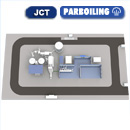In the vast, lush fields of rice paddies, a quiet revolution is taking place. Enter the world of mini mills, the tiny powerhouses that are changing the game in rice production. As technology continues to advance, these compact machines are proving to be a game-changer, revolutionizing the way rice is processed and paving the way for increased productivity and efficiency. Join us as we delve into the magic of mini mills and explore how they are transforming the age-old tradition of rice production.
- The Rise of Mini Mills in Rice Production
Mini mills have been transforming the rice production industry in recent years, offering a more efficient and cost-effective alternative to traditional rice mills. These compact machines are capable of processing paddy rice into polished white rice on a smaller scale, making them ideal for smallholder farmers and community cooperatives. With their compact size and simplified operation, mini mills have made it possible for more farmers to gain access to rice milling technology and increase their productivity.
One of the key advantages of mini mills is their ability to reduce post-harvest losses by processing rice closer to the point of production. This not only helps farmers to preserve the quality of their rice but also enables them to save on transportation costs. Additionally, mini mills are environmentally friendly, as they consume less energy and water compared to traditional mills. With the rise of mini mills in rice production, farmers are now able to take control of their milling process and maximize their profits.
- Unlocking Efficiency and Quality with Mini Mill Technology
The integration of mini mill technology in rice production has revolutionized the way rice is processed, bringing about unparalleled efficiency and quality in the industry. With its compact size and advanced capabilities, mini mills have redefined the traditional methods of rice milling, resulting in higher yields and superior product quality.
One of the key advantages of mini mills is their ability to streamline the production process, reducing waste and increasing productivity. By automating various stages of rice processing, such as dehusking, polishing, and grading, mini mills ensure consistent quality outcomes with minimal human intervention. This not only saves time and labor costs but also improves the overall efficiency of rice production. Additionally, mini mills are more eco-friendly than conventional rice mills, consuming less water and energy while producing less waste.
- Advantages of Mini Mills for Small-Scale Rice Farmers
Rice production has been revolutionized by the introduction of mini mills for small-scale farmers. These compact machines offer a range of advantages that have transformed the way rice is processed and milled, making it more efficient and cost-effective for farmers.
Some of the key advantages of mini mills for small-scale rice farmers include:
- Increased Efficiency: Mini mills are designed to process rice quickly and efficiently, saving farmers time and labor costs.
- Cost-Effective: Mini mills are affordable and require minimal investment, making them accessible to small-scale farmers with limited resources.
- Improved Quality: Mini mills produce high-quality rice with better taste and texture, ensuring a premium product for consumers.
- Embracing Innovation: Implementing Mini Mills in Rice Production Operations
Rice production operations are taking a significant leap forward with the introduction of Mini Mills. These innovative machines are revolutionizing the way rice is processed, offering a more efficient and streamlined approach to production. By embracing this new technology, farmers can increase their output, reduce processing time, and improve overall quality.
With Mini Mills, farmers have the ability to control every step of the milling process, from husking and polishing to sorting and packaging. This level of control not only ensures a higher quality end product but also allows for greater customization based on market demands. Additionally, Mini Mills are compact and easy to operate, making them ideal for small to medium-sized rice production operations. By implementing this cutting-edge technology, farmers can stay ahead of the curve and maximize their productivity in today's rapidly changing agricultural landscape.
To Conclude
As we have seen, the mini mill is truly a game-changer in revolutionizing rice production. By bringing cutting-edge technology to traditional rice milling practices, we are able to enhance efficiency, reduce waste, and improve the overall quality of rice produced. With the mini mill magic, the future of rice production looks brighter than ever before. So let's embrace this innovation and continue to push the boundaries of what is possible in the world of agriculture. The mini mill is here to stay, and it's time to let its magic work wonders for the industry.

